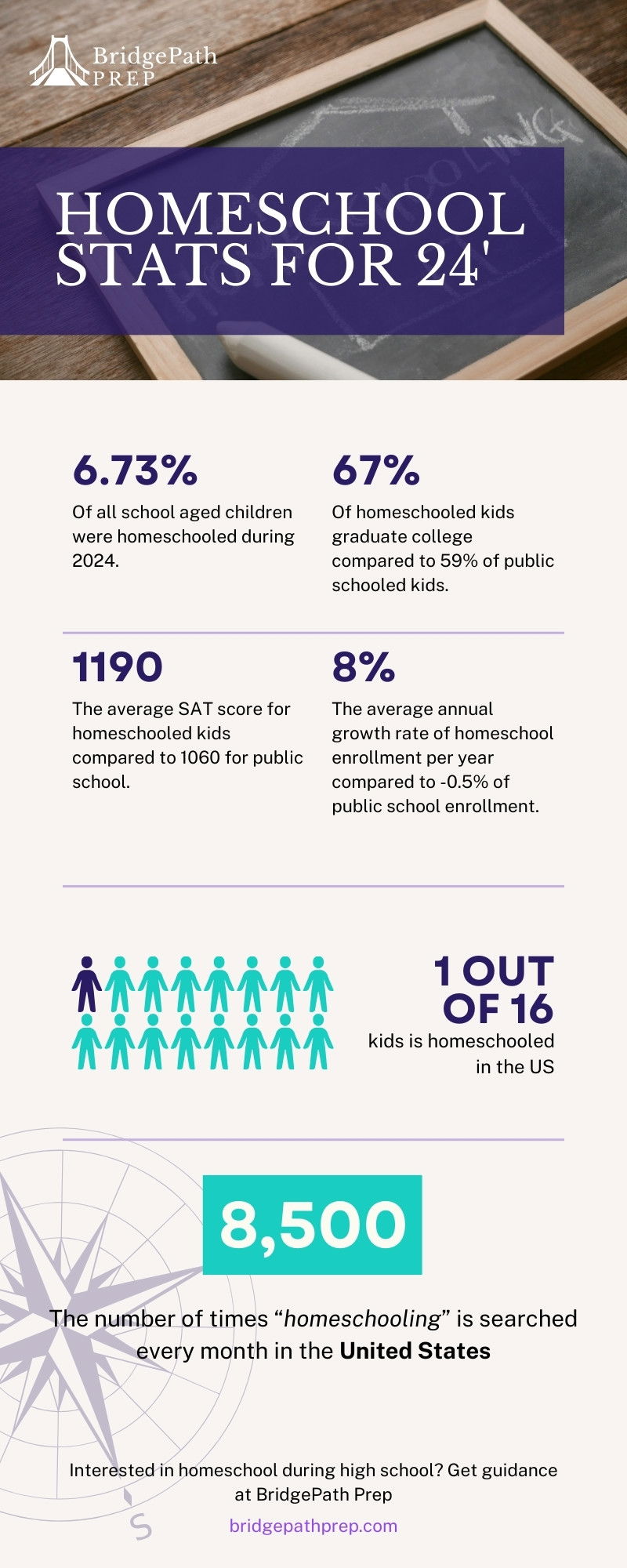
Thinking about homeschooling? You’re not alone! More families than ever are choosing to homeschool, and it’s easy to see why.
Homeschooling offers the freedom to create the best learning experience that works for your child and your family.
Whether you’re here because you’re curious, ready to take the leap, or just looking at options for high school, this intro to homeschool article is your gateway. This is a quick and easy read that covers what homeschooling is, is not, why families choose to do it, and some things you can do to make it enjoyable and work with your schedule.
Let's get started!
Homeschooling - the 10,000 ft view
Homeschooling is a different way of educating your child outside of the traditional schools you are probably used to.
Instead of relying on a set curriculum in a classroom, you are in charge of your child’s education!
whether that means teaching them yourself, encouraging them to become self-taught, using one of the many online programs, joining a homeschool co-op, or a mix of any.
The beauty of homeschooling is that it’s completely customizable. Your child can learn at their own pace, dive deep into subjects they’re passionate about, and explore the world in ways that go beyond the four walls of a classroom.

What it is
- A Customized Education: Homeschooling allows you to tailor your teen’s education to their specific needs. Whether they’re preparing for college, learning a trade, or exploring a passion like art or coding, you can focus on what matters most to them.
- Flexible Learning: Homeschooling doesn’t have to follow a rigid school schedule. Your teen can take advanced courses online, dive into hands-on projects, or explore internships and real-world experiences—all on a timeline that works for your family.
- Future-Focused: Homeschooling lets you prepare your teen for what’s next. From AP courses and dual enrollment at local colleges to certification programs and entrepreneurial ventures, the opportunities are endless.
- Family-Driven: High school homeschooling creates space for your family to work together to set goals, stay connected, and support your teen as they take on more responsibility for their education.
What it is not
- A One-Size-Fits-All Approach: Homeschooling doesn’t force your teen into a predetermined path. Instead, it’s an opportunity to create a personalized education plan that works for their goals—whether that means studying advanced STEM topics, diving into the arts, or focusing on life skills.
- Social Isolation: Homeschooling for high schoolers doesn’t mean they’ll miss out on friendships or activities. Many teens join co-ops, take community college classes, volunteer, or participate in sports, music, and other extracurriculars. Socialization looks different, but it’s far from absent.
- Rigid or Confined: Homeschooling is about flexibility. Your teen can learn at their own pace, pursue unique opportunities like apprenticeships or online courses, and build a schedule that fits their lifestyle—whether they’re a morning person or a night owl.
- Second-Rate Education: Homeschooling is just as valid and rigorous as any other form of education. In fact, homeschooled teens often excel academically because they have the freedom to focus on areas of strength and get extra help where needed.
Homeschooling laws by state - an overview
Homeschooling comes with a lot of freedom, but unfortunately, or fortunately, depending how you look at it , it’s not completely rule-free.
Each state has its own requirements, and knowing what’s expected is the first step to getting started. Don’t worry—it’s not as complicated as it sounds and if you scroll down, you'll get the basic gist of what you are going to deal with when it comes to homeschool and your state.
Do I need to notify the state?
In some states, you’ll need to file a letter of intent to homeschool. This is just a simple way to let your local school district know you’re taking charge of your teen’s education. States like Texas, Alaska, and Oklahoma don’t require any notification, giving you maximum flexibility!
The notice of intent can usually be filed online on the state's website or there will be an address to send a printed form off to.
Do I need to keep grades, test scores and other records?
Some states expect you to keep basic records, like attendance, progress reports, or test scores. Others, like Louisiana and Vermont, require detailed portfolios to show your teen’s learning activities. Many of the states require you to keep the records for a certain period of time, but there is no requirement for reporting any of those records to the state.
We highly recommend keeping detailed grades, and GPA's for the purpose of dual enrollment options, trade schools, and applying for college.
Trust me when I say, staying organized in the beginning will save you headaches later—and it helps to highlight your teen’s achievements for college or career goals!

Does my highschooler need to take tests, quizzes and assessments?
When it comes to tests and quizzes, the answer is no. These are not required.
Your homeschooler is not required to take quizzes on particular subjects or tests to show proficiency in something they just learned. That's up to you.
To be honest, one of the biggest reasons families choose homeschool over traditional schooling is to get away from unnecessary test taking.
But...
many states do require an annual standardized test.
We personally have reviewed, used, and recommend Academic Excellence. It is online, easy to purchase, and not expensive.
States like Pennsylvania, New York, North Carolina and many others require regular assessments, however states like Florida give you the option to choose how your teen’s progress is evaluated. So check with your state to see what the requirements are.
It’s all about showing growth, not perfection.
States with the easiest homeschooling rules 🎉
There are 11 states that leave the homeschooling up to the family and have minimal red tape and hoops to jump through. Here are the champions of homeschool:
- Idaho
- Alaska
- Texas
- Oklahoma
- Missouri
- Iowa
- Illinois
- Indiana
- Michigan
- New Jersey
- Connecticut
States with the strictest homeschooling rules 😢
And in the boo corner, we have the states that have more requirements, more red tape, more oversight, and more government control over your child's education. Here they are (it's never too late to move):
- North Dakota
- Pennsylvania
- Rhode Island
- Vermont
- New York
- Massachusetts
High school diplomas and graduation. How does that work?
Graduating as a homeschooler feels different that traditional school graduations, but it’s just as official and can be as easy as a celebration dinner or as extravagant as graduating underwater in scuba gear! We also recommend checking out your local area for homeschool graduation ceremonies. They are happening more and more and it can be a more formal graduation option.
Homeschooling gives you the power to customize the graduation process and create a memorable experience to remember the day.
As far as graduation requirements go, that's usually up to the family, but to be on the safe side, check with your state. If you are a community member here at BridgePath Prep, you've likely already got a plan of action and a timeline. Once that's complete, pop the champagne!
Many families follow a similar structure to public schools—think four years of English, three years of math, and two years of science. But the beauty of homeschooling is that you can adapt the requirements to fit your teen’s goals, whether that’s college, a career, or entrepreneurship, and we can help!
What about diplomas?
In most states, homeschool parents create and give a high school diploma. With homeschooling, your son or daughter can even formally graduate from "The School of Hard Knocks".
Be creative with your child's diploma. It’s just as valid as one from a public or private school. Pair it with a detailed transcript outlining your teen’s coursework, and they’ll have everything they need for college applications, jobs, or trade schools!
Homeschool time commitment - less than you think
Homeschooling doesn’t have to take over an entire day.
One of the biggest perks of homeschooling is how much more efficient it is compared to traditional schooling and can be achieved no matter if you work a 9-5 or you stay at home all day.
Let’s dive into how much time you’ll actually spend and how to balance it with everything else in life!
How much time does it really take?
Here’s the truth: homeschooling doesn’t require 6–8 hours of instruction each day. High schoolers need 3–5 hours depending on your after high school goals. We've seen high schoolers who are done at lunch and have time for a part-time job or dual enrollment. We've seen other high schoolers who take a lunch break and finish up an hour after. Either way, it demands less time than traditional school.
Why so much less time?
The answer is simple...
Homeschooling is all about quality over quantity. With one-on-one attention and no time wasted on transitions or busywork, your teen can get more done in less time. This leaves more time for other important aspects of life that often get left behind with traditional school hours.
Balancing #homeschoollife
Many parents we've spoken to or met that want to start homeschooling their teen during high school think it just isn't an option because of their work schedule or daily routine.
We are here to tell you it is possible!
Homeschooling doesn’t mean you have to put the rest of your life on hold. If you’re a working parent, there are co-ops, online options, and student-led learning. The important part is the accountability, not sitting right beside them as they figure out every single math problem.
If you have two kids in high school, it is even easier. They can work alongside each other and help out when needed. Remember, you're setting them up for future success. Most jobs require you to collaborate with coworkers to complete tasks.
It's all about teamwork!
The boom of homeschool formats & learning styles
Since homeschool has become more mainstream and is thought of less as a lifestyle for weird families, you've got a ton of options at your fingertips. We will be the first to tell you, no two families homeschool the exact same way, and that’s the beauty of it!
You get to pick (or mix!) a format that works best for your teen’s learning style, your teaching style, your availability, and the individual goals you are working towards.
Let's jump in to some of the most well known homeschool approaches today
Overview of homeschool approaches
There are several popular homeschooling methods to choose from, each with its own twist on education. Here’s a quick overview:
- Traditional: Think textbooks, workbooks, and structured schedules—similar to a traditional school setup, but at home.
- Unit Studies: A project-based approach where multiple subjects are tied together under a single theme, making learning interdisciplinary and fun.
- Classical Education: A rigorous, language-focused method emphasizing logic, critical thinking, and classic literature.
- Charlotte Mason: Centered on nature study, great books, art, and short, focused lessons. Less classroom, more real world.
- Unschooling: A child-led, interest-driven approach where kids explore their passions and learn organically as life unfolds.
- Online/Virtual School: A structured format using online curricula or virtual classrooms, offering flexibility with built-in accountability.
- Nature/Hands on Learning: School doesn’t always have to come from books and worksheets. Everyday life is full of opportunities for kids to learn and grow! From exploring nature to tackling real-world challenges, hands-on experiences teach math, writing, critical thinking, and most importantly, common sense.
Choosing what's right for your family
There’s no “one-size-fits-all” answer. Your homeschool format should fit your lifestyle, the learning style of your high schooler, the teaching style you like best, and the goals you and your child set.
- Learning Styles: Does your teen thrive with structure or prefer hands-on projects? Are they visual learners, readers, or more interactive?
- Parent Teaching Style: Are you drawn to a highly organized curriculum, or do you prefer a relaxed, go-with-the-flow vibe?
- Family Dynamics: Consider your schedule, other family commitments, and how much flexibility you need.
Don’t stress about getting it perfect right away! Homeschooling is for experimenting and making adjustments as you go. Many families blend methods to create their own unique style. The most important thing is avoiding burnout.
Avoiding burnout - failure is not an option!
I'm not going to lie, homeschool adds a new object to your juggling routine, and if you try to be an overachiever, you might find yourself crashing and burning. So let's talk about that.
Signs of burnout
#1 Burnout doesn’t happen overnight. So if you wake up and you don't feel like homeschooling that day... don't do it. It's your school. Burnout creeps in little by little and it's usually because your homeschool method or style doesn't match your lifestyle or learning style. Here’s what to watch for:
- For Parents: Feeling constantly exhausted, frustrated, or overwhelmed. You struggle to stay motivated and you feel like you’re not doing “enough.”
- For Kids: Showing disinterest in learning, frequent fatigue, or resistance to lessons and learning. They might seem disengaged or irritable during school time (leave room for teenageritis).
Tips for preventing burnout and increasing fun
Burnout can happen, but there are plenty of ways to keep it at bay. Here’s how:
- Incorporate Breaks and Downtime: Build regular breaks into your schedule for both you and your kids. Downtime is essential for recharging and staying energized.
- Use Community Resources: Join homeschool groups or co-ops for support and fresh ideas. Connecting with other families can make homeschooling feel less isolating.
- Share the Teaching Load: Don’t feel like you have to do it all. Lean on a partner, hire a tutor, or explore online programs to lighten your load.
- Practice Self-Care: As a parent and teacher, taking care of yourself is just as important as taking care of your kids. Prioritize rest, hobbies, and moments to recharge.
- Field Trips: Anything can be a field trip. Go to the lake, take a hike, or just take a day off!
What to remember
There is no or right way. It isn't a race. You are not competing in a classroom full of kids where your kid has to keep up. Go at your own pace, just make sure you are challenging them. Incorporate things that they find fun and you enjoy doing. Follow those simple rules and homeschooling is really fun!
Wrapping it all up
Homeschooling isn’t just school. It's like life...it’s an adventure! 🚀
It’s a chance to break free from the ordinary and create something extraordinary for your family. You’re not just teaching... you’re building memories, sparking curiosity, and empowering your kids to love learning in their own way (and yes, they will also be smarter).
Sure, it’s not always smooth sailing (no great adventure is!), but that’s part of what makes it so rewarding. You get to experiment, grow, and adapt as you go. Plus, who says “school” can’t look like a morning hike, a kitchen chemistry experiment, or a family movie about ancient history?
Again... there are no rules!
Remember: there’s no one-size-fits-all homeschool. You’re the captain of the USS Homeschool and the ocean is your adventure. Don’t worry about perfection—it’s the progress, love, and laughter that count.
So go ahead, take that chance.
You’re giving your kids something no one else can: a personalized, meaningful experience they’ll carry with them forever. You’ve got this, rockstar! 🎸✨
P.S. - don't forget to join the BridgePath Prep Community to get access to complete guides, answers from the experts, and a customized blueprint to help your child achieve his or her dreams!

There's no need to struggle with homeschool. Join BridgePath to get the answers and support you and your homeschooler need to succeed.
© BridgePath Prep. All Rights Reserved \\ CONTACT US
